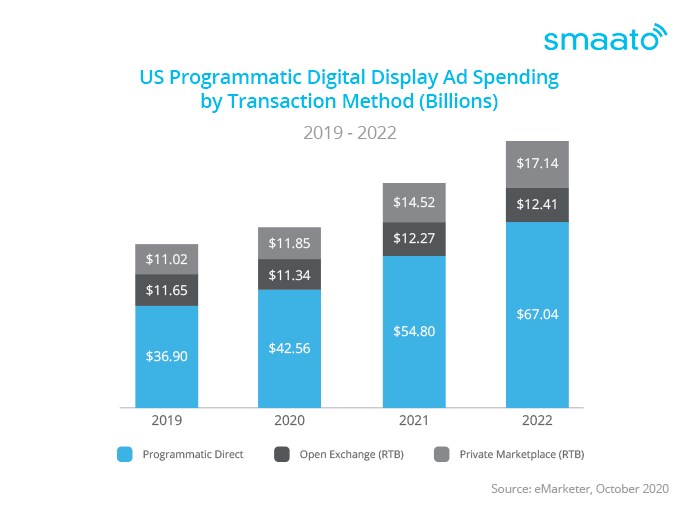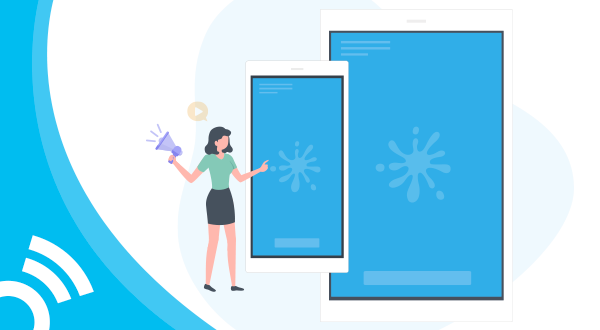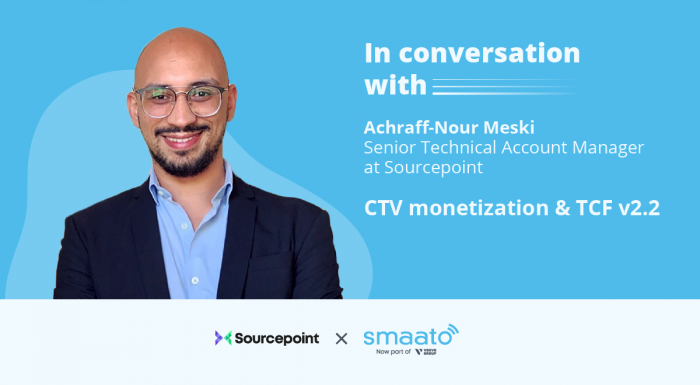Open Auction, Private Exchange, Preferred Deals, and Programmatic Guaranteed – oh my!
Open Auctions, with their quick efficiency and scalability, long dominated the programmatic playing field. But the industry is shifting its focus. Private Exchange and Programmatic Direct Deals (like Preferred Deals and Programmatic Direct) are now at the forefront. In fact, Private Exchange deals surpassed Open Exchange ones for the first time in 2020, and we expect the trend to continue.

Programmatic Guaranteed Deals, Private Exchange, and Preferred Deals all offer a higher level of brand safety for publishers and marketers compared to Open Auctions. Marketers can see exactly where their ads will appear. Publishers can know that low-quality ads won’t flood their inventory. Because these deals give marketers access to the highest quality ad inventory, eCPMs tend to improve, too. It’s no wonder, then, that these deals will continue to dominate ad spend in the coming years.
Despite their popularity, there remains a lot of confusion around programmatic deals and their overlapping features. Plus, the terminology doesn’t help. Each has multiple different names, which many use indiscriminately, adding to the confusion.
So what are each of these deals? Read on to find out.
The Four Programmatic Buy Types
Open Auction
Also called: Open Exchange, Real-Time Bidding (RTB), Open Marketplace, Smaato Exchange
In the Open Auction, all marketers have a chance to bid on all available inventory. With RTB, publishers set the floor price for an ad, but the demand still determines the final price.
Private Exchange
Also called: Private Marketplace (PMP), PMP Programmatic, Private Auction, Invitation-Only Auction
For the Private Exchange, each publisher sets a floor price and hand-selects which marketers can participate. (They’ll need to use a time-sensitive deal ID to join the RTB auction.) Publishers get control over who can bid on their premium inventory. Marketers gain an opportunity for hyper-relevant placements and brand alignment.
Programmatic Guaranteed
Also called: Guaranteed Buy, Programmatic Direct, Automated Guaranteed
Programmatic Guaranteed Deals replace the manual IO with the efficiency of programmatic pipes. Publishers can count on guaranteed revenue. Marketers get guaranteed impressions (or share of voice – you pick). Programmatic Guaranteed offers the highest level of transparency and creative control.
Preferred Deals
Also called: Unreserved Fixed Rate, Programmatic Non-Guaranteed
Preferred Deals offer flexibility and reliability. In this 1:1 arrangement, publishers and marketers negotiate a fixed price for premium ad space, without the obligation of a direct buy. Marketers get a first look at premium inventory, while publishers gain greater control over their revenue stream.
So, how do you tell all these deal types apart? A quick analogy might help.
Programmatic Deal Analogy
Let’s say Vanessa is an avid baseball fan. She goes to the MLB site, and clicks to buy season tickets. She sees exactly what seats she wants and how much they will cost. Plus, she can add them to her cart and buy them without ever having to deal with a sales person. The seats she buys are the ones she’ll have all season. This is like a programmatic guaranteed deal. The inventory is set, and so is the price. When Vanessa makes the commitment to buy the season tickets, she’s obligated to pay for them, and she knows she will have them for the full season.
Lamont is also a huge baseball fan. He and Vanessa agree that if there’s ever a game she can’t make, she’ll give him a chance to buy the ticket off of her. He’ll pay face value. Whenever she can’t make it to a game, she’ll call up Lamont and offer him the ticket. He isn’t obligated to buy it, but he has “first dibs” on this seat. That’s like a preferred deal. Vanessa and Lamont have negotiated a price up front, but he isn’t required to purchase the ticket. If her plans change, Vanessa isn’t obligated to sell it to him, either.
If Lamont decides not to go to the game, Vanessa still wants an opportunity to recoup some of her costs. She has a few options.
She can post the ticket in a private, baseball-lovers slack channel at work. The eight people in the group can offer different amounts for the ticket. It makes sense that Vanessa will sell to the highest bidder. The people in the channel are avid sports fans, and are likely to try to outbid each other to get to see the game. That’s like a private exchange – an invite-only opportunity for relevant audiences to bid on non-guaranteed inventory.
Or, Vanessa can post the tickets on StubHub. Here, they are available to anyone in the public (sports lovers and non sports lovers alike). In this scenario, Vanessa will almost certainly be able to offload the ticket, since so many people will have a chance to express an interest. But, she’s not the only one offering tickets to games, and she may not get face value. This is like an open auction. There’s both more supply and more demand, and the highest bid will win.
Want to learn about the benefits of each of these programmatic deals?




